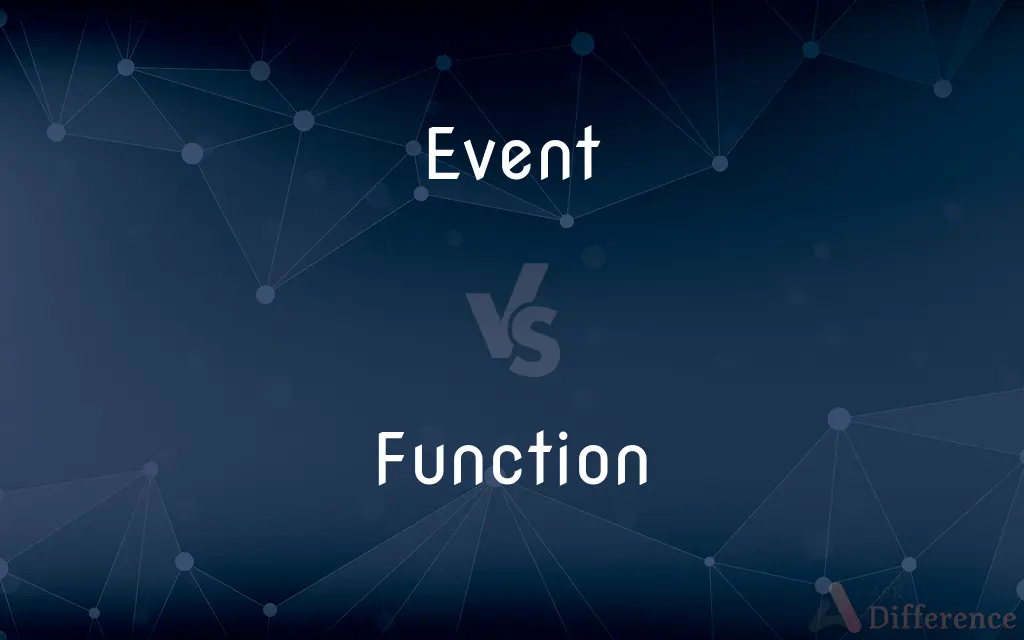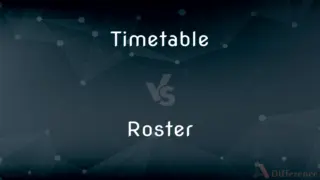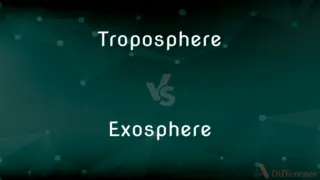Event vs. Function — What's the Difference?
Edited by Tayyaba Rehman — By Maham Liaqat — Updated on March 11, 2024
Events are specific occurrences within a system, whereas functions are blocks of code designed to perform a particular task.

Difference Between Event and Function
Table of Contents
ADVERTISEMENT
Key Differences
An event is an action or occurrence recognized by software that may be handled by the software or user. For example, clicking a button on a website might trigger an event. On the other hand, a function is a reusable piece of code that is designed to carry out a specific task.
Events are typically used to trigger responses or actions within a program when certain conditions are met or specific actions are taken by the user. Functions can take inputs, process them, and return outputs. They are fundamental building blocks in programming that help in modularizing code for better readability, maintainability, and reusability.
While events are about "what happens," functions are more about "what to do" in response to an event or as part of a program's flow. An event might trigger a function, but a function can exist and operate independently of events.
Events are inherently more about interaction and responsiveness within systems, focusing on the dynamic aspects of programming, such as user inputs, system triggers, or changes in state. Functions, however, are more static and defined, focusing on the implementation of specific tasks or calculations.
Functions can be invoked by events, illustrating a common relationship where an event handler function is called in response to an event. This highlights how events can drive the flow of a program by triggering specific functions as responses to user actions or system changes.
ADVERTISEMENT
Comparison Chart
Definition
An occurrence or action within a system
A block of code designed to perform a specific task
Trigger
Triggered by user actions or system changes
Invoked explicitly in code or by an event
Purpose
To signal that something has happened
To execute a particular set of instructions
Responsiveness
About reacting to changes or actions
About performing tasks and calculations
Relationship
Can trigger functions or be part of a reactive flow
Can be triggered by events or called independently
Compare with Definitions
Event
Moving a mouse over a specific area can be an event.
The onMouseOver event triggers when the user hovers over a designated area.
Function
A function can calculate the sum of two numbers.
The add(a, b) function returns the sum of a and b.
Event
A system change, like a file being created, is an event.
The onFileCreated event fires when a new file is detected in a directory.
Function
A function can sort a list of items.
The sort(list) function organizes the items in list into a specified order.
Event
Pressing a key on the keyboard generates an event.
The onKeyPress event captures and responds to key inputs from the user.
Function
A function can send an email.
The sendEmail(to, subject, body) function sends an email to the specified recipient.
Event
Receiving an email can trigger an event in an application.
An onEmailReceived event may start an automated process to categorize the email.
Function
A function can convert temperatures from Celsius to Fahrenheit.
The convertToFahrenheit(celsius) function returns the Fahrenheit equivalent of a Celsius temperature.
Event
A user clicking a button is an event.
In web development, an onClick event triggers when the user clicks a button.
Function
A function can validate user input in a form.
The validateForm(input) function checks if the input meets certain criteria.
Event
Something that takes place, especially a significant occurrence.
Function
An activity that is natural to or the purpose of a person or thing
Bridges perform the function of providing access across water
Bodily functions
Event
A social gathering or activity
The fundraising event was held in the ballroom.
Function
A relation or expression involving one or more variables
The function (bx + c)
Event
(Sports) A contest in a sports competition, such as a meet
Swimming events.
Function
A thing dependent on another factor or factors
Class shame is a function of social power
Event
(Physics) A phenomenon or occurrence located at a single point in spacetime, regarded as the fundamental observational entity in relativity theory.
Function
A large or formal social event or ceremony
He was obliged to attend party functions
Event
(Archaic) A final result; an outcome.
Function
Work or operate in a proper or particular way
Her liver is functioning normally
Event
An occurrence; something that happens.
Function
A person's role or occupation
In my function as chief editor.
Event
A prearranged social activity (function, etc.)
I went to an event in San Francisco last week.
Where will the event be held?
Function
(Computers) A procedure within an application.
Event
One of several contests that combine to make up a competition.
Function
An official ceremony or a formal social occasion
Disliked attending receptions and other company functions.
Event
An end result; an outcome (now chiefly in phrases).
In the event, he turned out to have what I needed anyway.
Function
Something closely related to another thing and dependent on it for its existence, value, or significance
Growth is a function of nutrition.
Event
(physics) A point in spacetime having three spatial coordinates and one temporal coordinate.
Function
A variable so related to another that for each value assumed by one there is a value determined for the other.
Event
(computing) A possible action that the user can perform that is monitored by an application or the operating system (event listener). When an event occurs an event handler is called which performs a specific task.
Function
A rule of correspondence between two sets such that there is exactly one element in the second set assigned to each element in the first set. Also called mapping.
Event
(probability theory) A set of some of the possible outcomes; a subset of the sample space.
If is a random variable representing the toss of a six-sided die, then its sample space could be denoted as {1,2,3,4,5,6}. Examples of events could be: , , and .
Function
To have or perform a function; serve
Functioned as ambassador.
Event
(obsolete) An affair in hand; business; enterprise.
Function
To deal with or overcome the challenges of everyday life
For weeks after his friend's funeral he simply could not function.
Event
(medicine) An episode of severe health conditions.
Function
What something does or is used for.
Event
(obsolete) To occur, take place.
Function
A professional or official position.
Event
To be emitted or breathed out; to evaporate.
Function
An official or social occasion.
Event
To expose to the air, ventilate.
Function
Something which is dependent on or stems from another thing; a result or concomitant.
Event
That which comes, arrives, or happens; that which falls out; any incident, good or bad.
To watch quietly the course of events.
There is one event to the righteous, and to the wicked.
Function
A relation where one thing is dependent on another for its existence, value, or significance.
Event
An affair in hand; business; enterprise.
Function
(mathematics) A relation in which each element of the domain is associated with exactly one element of the codomain. Category:en:Functions
Event
The consequence of anything; the issue; conclusion; result; that in which an action, operation, or series of operations, terminates.
Dark doubts between the promise and event.
Function
(computing) A routine that receives zero or more arguments and may return a result.
Event
To break forth.
Function
(biology) The physiological activity of an organ or body part.
Event
Something that happens at a given place and time
Function
(chemistry) The characteristic behavior of a chemical compound.
Event
A special set of circumstances;
In that event, the first possibility is excluded
It may rain in which case the picnic will be canceled
Function
(anthropology) The role of a social practice in the continued existence of the group.
Event
A phenomenon located at a single point in space-time; the fundamental observational entity in relativity theory
Function
(intransitive) To have a function.
Event
A phenomenon that follows and is caused by some previous phenomenon;
The magnetic effect was greater when the rod was lengthwise
His decision had depressing consequences for business
He acted very wise after the event
Function
(intransitive) To carry out a function; to be in action.
Function
The act of executing or performing any duty, office, or calling; performance.
Function
The appropriate action of any special organ or part of an animal or vegetable organism; as, the function of the heart or the limbs; the function of leaves, sap, roots, etc.; life is the sum of the functions of the various organs and parts of the body.
Function
The natural or assigned action of any power or faculty, as of the soul, or of the intellect; the exertion of an energy of some determinate kind.
As the mind opens, and its functions spread.
Function
The course of action which peculiarly pertains to any public officer in church or state; the activity appropriate to any business or profession.
Tradesmen . . . going about their functions.
The malady which made him incapable of performing hisregal functions.
Function
A quantity so connected with another quantity, that if any alteration be made in the latter there will be a consequent alteration in the former. Each quantity is said to be a function of the other. Thus, the circumference of a circle is a function of the diameter. If x be a symbol to which different numerical values can be assigned, such expressions as x2, 3x, Log. x, and Sin. x, are all functions of x.
Function
A religious ceremony, esp. one particularly impressive and elaborate.
Every solemn function' performed with the requirements of the liturgy.
Function
A public or social ceremony or gathering; a festivity or entertainment, esp. one somewhat formal.
This function, which is our chief social event.
Function
To execute or perform a function; to transact one's regular or appointed business.
Function
A mathematical relation such that each element of one set is associated with at least one element of another set
Function
What something is used for;
The function of an auger is to bore holes
Ballet is beautiful but what use is it?
Function
The actions and activities assigned to or required or expected of a person or group;
The function of a teacher
The government must do its part
Play its role
Function
A relation such that one thing is dependent on another;
Height is a function of age
Price is a function of supply and demand
Function
A formal or official social gathering or ceremony;
It was a black-tie function
Function
A vaguely specified social event;
The party was quite an affair
An occasion arranged to honor the president
A seemingly endless round of social functions
Function
A set sequence of steps, part of larger computer program
Function
Perform as expected when applied;
The washing machine won't go unless it's plugged in
Does this old car still run well?
This old radio doesn't work anymore
Function
Serve a purpose, role, or function;
The tree stump serves as a table
The female students served as a control group
This table would serve very well
His freedom served him well
The table functions as a desk
Function
Perform duties attached to a particular office or place or function;
His wife officiated as his private secretary
Common Curiosities
What is an event in programming?
An event is a specific action or occurrence that a software can detect and respond to, such as a user clicking a button.
What is a function in programming?
A function is a reusable block of code designed to perform a particular task, which can take inputs and return an output.
How do events differ from functions?
Events signal that something has happened, while functions are specific tasks or operations to be performed.
How are events detected in a program?
Events are detected using event listeners or handlers that are programmed to respond to specific actions or occurrences.
Can a function be triggered by an event?
Yes, functions can be invoked in response to an event, known as event handlers.
Is it possible to have functions without any events in a program?
Yes, in non-event-driven programs, functions can be called in a predefined order without relying on events.
Can a function exist without events?
Yes, functions can operate independently of events and be called explicitly in the code.
How do functions enhance program modularity?
Functions allow code to be broken down into reusable pieces, enhancing readability, maintainability, and reusability.
Are events dependent on functions?
Not necessarily, but events often trigger functions as a way to respond to the event.
Do all events trigger functions?
Not all events trigger functions; it depends on how the program is designed.
What is an example of an event-driven program?
A GUI application where user actions like clicks, hovers, or keypresses trigger specific responses.
How can functions and events work together in a program?
Functions can be designed to respond to events, allowing for a dynamic and responsive program architecture.
What role do events play in interactive applications?
Events are crucial for interactivity, allowing the application to respond dynamically to user inputs and system changes.
Can a single event trigger multiple functions?
Yes, a single event can trigger multiple functions or a chain of functions depending on the program's design.
Can events occur outside of user interactions?
Yes, events can also be triggered by system changes, timers, or other external factors.
Share Your Discovery

Previous Comparison
Timetable vs. Roster
Next Comparison
Troposphere vs. ExosphereAuthor Spotlight
Written by
Maham LiaqatEdited by
Tayyaba RehmanTayyaba Rehman is a distinguished writer, currently serving as a primary contributor to askdifference.com. As a researcher in semantics and etymology, Tayyaba's passion for the complexity of languages and their distinctions has found a perfect home on the platform. Tayyaba delves into the intricacies of language, distinguishing between commonly confused words and phrases, thereby providing clarity for readers worldwide.
















































